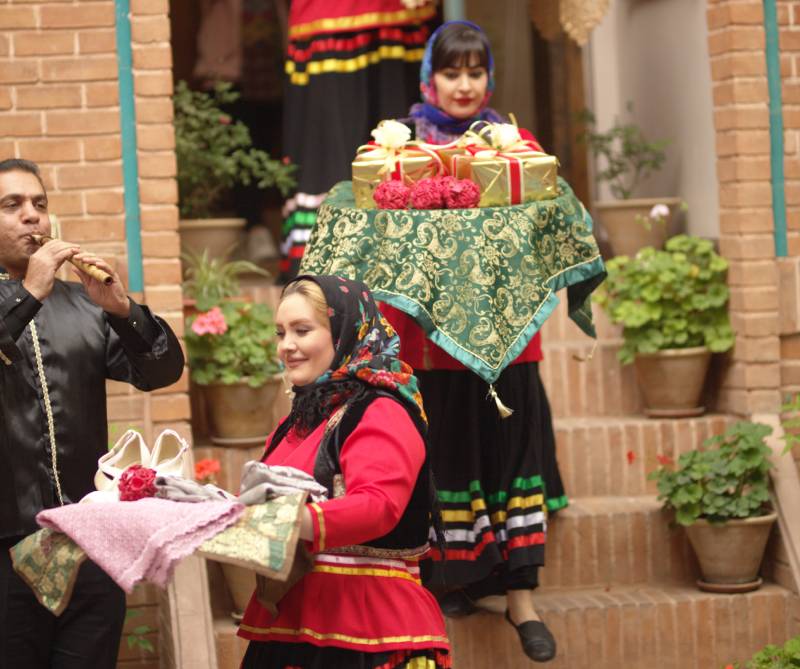
Nowadays, Iranian weddings are so much like the American-style weddings.
Big, extravagant and loud.
It might be interesting to know that after a long or short relationship, the groom-to-be and his parents are expected to go to the bride-to-be's parents with sweets and flowers to basically ask for the permission of the bride's parents and get to know each other better. This is often the matter of formality. The bride and groom have probably talked about everything regarding the wedding and marriage ceremony together but it is a custom to involve parents and ask for their permission out of respect.
During the so-called "proposal", parents get to know each other and exchange good words about their kids. The parents of the bride ask about the groom's job, housing situation and future plans. This would often be the case in more traditional marriages but I guess these days there is a more sense of equality rather than expecting man to pay for everything. Women work. alongside men in the society and sometimes earn even more money than their husbands.
Mehrieh
(property or gold coins brides are entitled to ask to be paid anytime they wish)
Essentially, this money-trade might sound very insulting and cheap, however there is a reason behind all this. Iran is a upon conventional archetypes of the patriarchy. Women are often deprived of any right unless mentioned and asked for as conditions in their marriage registration papers. If not mentioned and asked for in the marriage papers, the woman can't get a divorce if the man does not want to, she can't have the custody of her children after the age of 4 and the right is given to the father and even if the father dies, grandfathers and uncles are prioritised to the mother herself.
Two generations before, women were literally more docile and easier to be controlled by men but a few years after the revolution, women learned to fight for their rights but sometimes even in negative ways. In a country where a woman can be divorced without her even being aware, that the husband is allowed to be a polygamous or he can get away from paying after the divorce.
All these create a terror in women's heart wondering "what will happen to me if I am divorced, if I am not financially independent because my husband didn't want me to work and earn money freaing my independance." All this leaves them with one option and that is a financial guarantee in case things go wrong and that's when Mehrieh makes perfect sense. Not to mention that after some years it became sort of a business for young women to be married to old men and ask for heavy Mehrieh and later divorce them and ask to be paid.
Aghd
(marriage registration)
Before couples have the wedding party, they can register their marriage in the notary office. Between the marriage registration and the wedding, the parents of the bride are expected to pay for all the furniture the daughter and the future husband will need. Though there are always exceptions, this is the tradition.
Food of the wedding
The food that is served at Iranian weddings can be as extended as it can get. My wedding in Iran was celebrated in the most traditional way. Simple, pure and truly Iranian void of any modern luxury and ostentatiousness. The food was simply bread, cheese and herb sandwich my mom would make me as my school lunch as well as a thick legum Persian soup called ash and red lentil soup. Serving this food to any Iranian girl who is about to celebrate her wedding would sound insane.
If you wish to organise a casual luncheon, a business gathering or a joyfull wedding in Belgium or The Netherlands, please take a look at the catering options and contact me to see how we can turn your event into a memorable happening.All 50 recipes in my cookbook have 5 major ingredients, carefully chosen to respect the original dishes on which they are based. You can easily order my cookbook online or come pick it up. Participants to a workshop get a €5 discount.Join others and learn how to cook and bake a four-course Persian meal. All workshops are held in Belgium or The Netherlands and participants get a €5 discount on my cookbook.You can find many recipes on the website. Most recipes use Persian cooking essentials like indigenous herbs, spices, nuts and fruits. You can also find 50 recipes in my cookbook.Many cities in Iran are on the UNESCO heritage list. Read some culinary travel stories on how I experience my country or learn more about its culture and history.My professional approach of food photography makes your recipes and food products shine in cookbooks, product packaging, online use, catalog or menus.Follow me on Instagram to view my latest updates. In case of any questions or reservations please do not hesitate contacting me by filling in the form.











